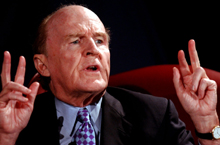| Home | Blog | Ask This | Showcase | Commentary | Comments | About Us | Contributors | Contact Us |

Why hasn't competition come to CEOs?ASK THIS | June 178, 2008In the 1970s, CEOs made 30 times as much as the average worker; by 2006, it was 370 times as much. All the while, market forces have steadily reduced costs across the board. Why are chief executives immune? By Henry M. Banta As we are reminded in almost every business story, competition is the great organizing principle of the American economy. It spurs innovation and creativity; it rewards the risk-taking entrepreneur, it is a bulwark of consumer protection; it saves us from the strangulation of government regulation. And above all, it drives down costs and prices. It is the key to the efficiency of our economic system. The last couple of decades have seen unprecedented competitive market forces. Rapid technological change, falling trade barriers, globalization, deregulation of markets, increased mobility of capital and labor—all have contributed to downward pressure on costs. Virtually every business has felt the competitive pressure and struggled to find cheaper inputs, cheaper labor and lower taxes. Work-forces are downsized; health insurance is cut, and pension plans abolished. But one cost has been immune from this pressure: the compensation of top management. This issue has gotten a lot of media coverage. The press has eagerly covered the lavish compensation that has been heaped on CEOs, particularly those accused of misdeeds or incompetence. Yet there has been a total failure to ask the simple and obvious question: Why hasn’t competition squeezed management compensation like every other cost? This is a very important question with serious policy implications. It’s a question the press needs to explore in addressing the problems of corporate governance and economic inequality. The explosion of management compensation has been extensively documented. In the 1970s CEOs earned 30 times the wages of the average American worker. By 1993 the CEO compensation had risen to 131 times workers’ wages; and by 2006 it approached 370 times. Bebchuk and Grinstein (of Harvard Law School and Cornell University respectively) found that from 1993 to 1997 the top five executives at each of the 1,500 largest publicly traded corporations cumulatively received $68 billion in salary, bonuses and stock; from 1999 to 2003 this had risen to $122 billion. They also put the increase in terms of a percentage of earnings, finding that executive compensation was 5 percent of net revenue of their own corporations in 1993 to 1995 and had almost doubled to 9.8 percent in 2001 to 2003. This issue takes on singular importance in light of the seminal paper by Thomas Piketty and Emmanuel Saez (of the Ecole d’Economie de Paris, and the University of California, Berkeley, respectively), “Income Inequality in the United States, 1913-1998.” (The data in this paper have now been updated through 2006.) The study shows that over the last several decades the United States experienced a massive shift in income to the top of the population. Particularly dramatic is the comparison between the top 1 percent and the remaining 99 percent in the 1993-2000 expansion of the Clinton administration and the 2002-2006 expansion of the Bush administration. During both expansions, the incomes of the top 1 percent grew extremely quickly at an annual rate over 10.1 and 11.0 percent respectively. However, while the bottom 99 percent of incomes grew at a solid pace of 2.4 percent per year from 1993-2000, these incomes grew less than 1 percent per year from 2002-2006. Thus, from 2002 through 2006, the top 1 percent captured almost three-quarters of income growth. Unlike in the past when disparity in income could be accounted for by inherited wealth, most of this shift could be accounted for by an increase in management compensation. Piketty and Saez found that now more than four-fifths of the income of the top one percent comes from salaries and self-employment. It is estimated that the share of wages and salaries earned by the top 1 percent jumped from 5.1 percent in 1970 to 12.0 percent in 2006. The sheer scale of this increase is breathtaking. It is certainly one of the largest shifts in income ever experienced by a major nation. As Paul Krugman interpreted Piketty’s and Saez’s data: “...[G]rowth didn’t just bypass the poor and lower middle class, it bypassed the upper middle class too. Even people at the 95th percentile of the income distribution – that is, people richer than 19 out of 20 Americans – gained only modestly. The big increases went only to people who were already in the economic stratosphere.” In sum, then, we have had a massive shift in income that is largely explained by a massive increase in corporate management compensation. Which brings us back to the basic question: where were the forces of competition when management compensation exploded? What makes this question so compelling is that those who try and defend the income shift to the very top seem driven to arguments that are conspicuously weak or irrelevant. Their unwillingness to honestly address the question makes one suspect that something important is at stake. In general the apologists have sought to explain the shift in terms of the income differences between the middle and lower income groups. They uniformly ignore the difference between the very top income bracket – the top 1 percent – and everybody else. The most frequently cited explanation is globalization. According to this argument, labor costs are squeezed by competition from countries with lower labor costs. Workers with less valuable skills are particularly vulnerable to the competition from less wealthy nations. This is true – but irrelevant. It does not even address what has happened at the very top. Globalization may explain wages tightening at the bottom of the economic ladder, it says nothing about the more substantial increases at the top. Why should a squeeze of the lower end of the income scale result in a massive increase at the top? Has any board of directors ever justified its management compensation policy by claiming, “The Chinese made us do it”? Another frequent explanation is that the management was worth it. There has been a quite lively debate over whether management compensation is related to performance. The best that can be said about this claim of correlation between compensation and performance is that it is very weak. Justification of an income shift of such historic proportions should be supported by better evidence. For example, there is the problem of timing. Business Week noted that 1996 was a very good year: The Standard & Poor’s 500-stock index rose 23 percent, and corporate profits rose 11 percent. But the average salary and bonus for a CEO rose “a phenomenal 39 %” – to $2.3 million. When retirement benefits, incentive plans, and gains from stock options were added in the average total compensation rose to “an astounding 54 %”– to $5,781,300.” It is worth noting that the anecdotal evidence on CEO compensation is replete with examples of blunderers and miscreants whose pay soared into the tens of millions. Of course if management was worth so much, it logically follows that everybody else got so little because that was all they were worth. For a period in which productivity was growing, this argument has a lot to overcome. Indeed the notion that the efforts of all of the computer programmers, store managers, physicists, chemical engineers, dentists, school teachers, construction workers, etc., made only a small contribution to growth is very close to silly. The current favorite argument of the apologists of CEO pay is that it is all a matter of education. This thesis was recently propounded by no less an economist than N. Gregory Mankiw. It was supported by research showing that income is reflective of education. Mankiw acknowledges the growth in inequality at the very top, but quickly turns the discussion to the gaps at the middle and bottom of the scale. It does not require a lot of economic research to show that more education results in higher income. But again, this is not the issue. It defies reason and good sense to claim the huge income difference between the top one tenth of one percent of the population and every one else is the result of education. As Krugman noted, “What we’re seeing isn’t the rise of a fairly broad class of knowledge workers. Instead, we’re seeing the rise of a fairly narrow oligarchy: income and wealth are becoming increasingly concentrated in the hands of a small, privileged elite.” He cited the 2006 Economic Report of the President which found that the real earnings of college graduates fell by more than 5 percent between 2000 and 2004. Between 1975 and 2004 their earnings rose by less than 1 percent per year. He noted that CEOs and school teachers have about the same amount of education. International comparisons of management compensation offer no solace to the apologists for American corporate salaries. The explosion in compensation is, as a general proposition, largely confined to the English-speaking world: the United States, Canada, and the United Kingdom, with the United States well ahead of the other two nations. No one has yet claimed that continental European and Japanese CEOs are immune from the forces of globalization, less competent or productive, or are just not as well educated as their American counterparts. We are, therefore, left with the question: Why was management compensation immune from the cost-squeezing forces of competition? Where are the media on the question?
|
||||||||||||




